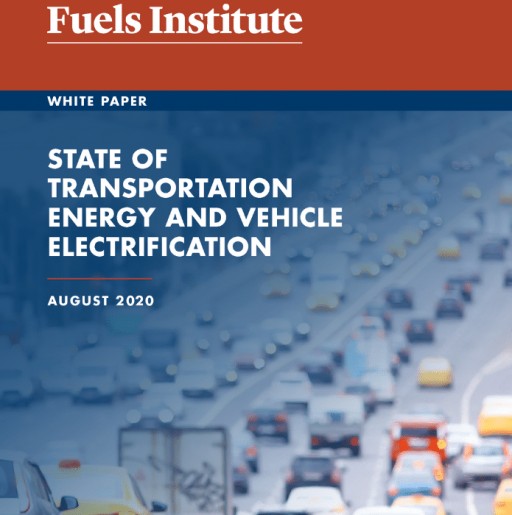
ALEXANDRIA, Va. - August 24, 2020 - (Newswire.com)
Electric vehicles (EVs) are entering the market at a rapid pace, but it could take decades for these vehicles to become more ubiquitous across the entire U.S. vehicle fleet, according to a new report released today by the Fuels Institute: “State of Transportation Energy and Vehicle Electrification.”
“Even if the U.S. government were to mandate that 100% of new vehicles sold must be equipped with a new technology, and all other market dynamics remained the same, it would take nine years for that technology to be present in 50% of the vehicles on the road,” explained John Eichberger, executive director of the Fuels Institute. “This is primarily due to the sheer size of the existing fleet and the length of time vehicles remain in service.”
Despite slow fleet turnover, new technologies are capturing a significant share of new vehicles sold, which has improved efficiency and reduced emissions. “Through 2018, there was little reliance on electrified powertrains to achieve these improved efficiencies. Instead, engineers focused on boosting fuel economy and reducing emissions by improving technologies within the internal combustion engine,” said Eichberger. “Today, most of the focus is on electrified powertrains, but that is only one tool vehicle manufacturers have available to meet fuel economy and performance standards, and there is still a lot of progress to be made on ICEs.”
The U.S. Energy Information Administration’s Annual Energy Outlook 2020 forecasts that light-duty fleet fuel economy will improve by 47% by 2040, with total passenger cars on the road delivering 42 mpg and light trucks delivering 30 mpg. If these forecasts transpire in the market, these efficiency gains could reduce gasoline consumption by 13% to 26% and diesel fuel consumption by 3% to 15%.
The continued reliance on ICEs for the foreseeable future to meet global environmental demands will result in additional technological improvements to engines as well as expand the use of alternative and renewable fuels. “Drivers will continue to consume liquid fuels for the foreseeable future, but the composition of those fuels could evolve to deliver greater performance and lower emissions,” Eichberger said.
The “State of Transportation Energy and Vehicle Electrification” report is available at www.fuelsinstitute.org/research and the introduction video is available at https://youtu.be/eafQjbi0Vzk.
The Fuels Institute, founded by NACS in 2013, is a non-profit research-oriented think tank that evaluates market issues related to vehicles and the fuels that power them, incorporating the perspective of diverse stakeholders to develop and publish peer-reviewed, comprehensive, fact-based research projects.
Media Contact:
John Eichberger
Phone: 703.518.7971
Email: jeichberger@fuelsinstitute.org
Related Links
Fuels Institute Research
Press Release Service by Newswire.com
Original Source: The Vehicle Market Will Take Decades to Evolve to New Technology
